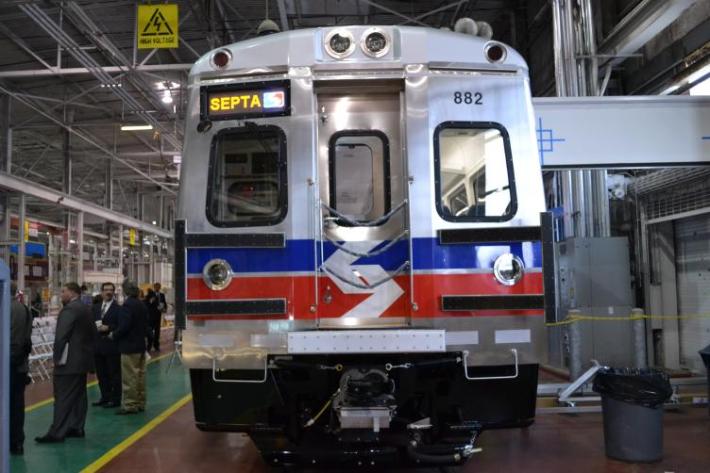Philadelphia's commuter rail system has been plunged into turmoil after transit officials discovered a defect in SEPTA railcars this weekend.

All 120 railcars delivered just three years ago by Hyundai Rotem, an American subsidiary of the Hyundai Motor Group, have cracks in load-bearing components. SEPTA officials say caution requires them to remove the cars from service for repairs.
That means 30 percent of the regional rail system's rolling stock is out of commission, and SEPTA doesn't have many trains to spare, reports the Philly Inquirer. Crowding, delays, and a general diminishment in service are expected to last through the summer as the agency works with the supplier to correct the problem.
In the interim, SEPTA may try to borrow cars from NJTransit or Amtrak, according to local news sources. But major disruptions seem unavoidable. The Delaware Valley Association of Rail Passengers is advising its 400 members to look into flextime or telecommuting.
"I guess I'll start driving," one rider told the local NBC affiliate after waiting an hour for a train. "It's too much."
Hyundai Rotem's Silverliner V model was supposed to be SEPTA's "most advanced" railcar. Even before this critical defect, however, there was a long delay in delivering the cars.
The supplier is taking heat for shoddy workmanship. But SEPTA's railcar troubles are also linked to two key sets of federal regulations.
Federal Railroad Administration safety rules
Federal rail safety regulations require transit agencies to purchase railcars built to withstand enormous forces in the event of a collision without deformation. These rules make U.S. trains much heavier than Asian or European models and often necessitate custom designs.
Matt Mitchell of the Delaware Valley Association of Rail Passengers suggested to the Inquirer that these customizations may have played a role in the Silverliner V defects. But Mitchell told Streetsblog that without a detailed engineering study it's too early to reach conclusions.
Even if this particular defect does not stem directly from any FRA regulation, however, the agency's safety rules greatly complicate the process of procuring railcars, which introduces uncertainty and risk. Hyundai, for example, had never constructed stainless steel railcars to FRA standards prior to this order. Other international suppliers have struggled to deliver railcars to FRA specs on time and on budget.
The FRA safety regulations are in line for revision, but anticipated updates have been delayed.
Buy America requirements
The FRA and Federal Transit Administration both require trains to be built with a certain percentage of components and materials manufactured in America. Silverliner V cars were built at a Philly factory by an American subcontractor to Hyundai Rotem. The specific defective component may have come from Columbus Castings, based in Ohio.
To comply with the Buy America rule and make its bid more attractive, Hyundai spent $25 million building a railcar factory in Philadelphia and flew many of the workers to Korea for training, according to McClatchy. The manufacturing process was plagued with problems, and the railcars weren't delivered until 2013, almost three years late. "Material delays, design flaws, labor-management disputes, and workmanship problems delayed the delivery of the last of the cars," reports the Inquirer.
Even after the Silverliner V cars were in service, they had problems with malfunctioning doors.
SEPTA wasn't the only transit agency to purchase Silverliner V railcars -- Denver's RTD bought the same model. It's not clear yet whether Denver's trains suffer from the same defect.




